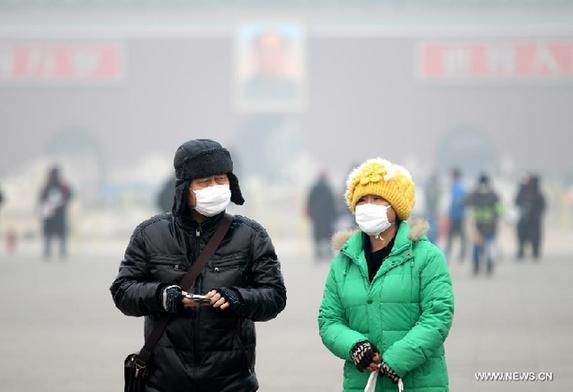Beijing battling lingering air pollution
 0 Comment(s)
0 Comment(s) Print
Print E-mail Xinhua, January 14, 2013
E-mail Xinhua, January 14, 2013
Choked in dense smog for three consecutive days, Beijing started emergency response measures on Sunday to curb the hazardous air pollution.
Yet more efforts are needed to control pollution in the long run both in Beijing and other Chinese cities, where the air has held excessive levels of major pollutants in the past few days.
 |
|
People visit the Tian'anmen Square in Beijing, capital of China, Jan. 11, 2013. [Xinhua] |
Monitoring data showed the Air Quality Index in most parts of the capital reached 500, the maximum level of pollution, on Sunday morning.
By 2 p.m. Sunday, readings for PM2.5, or airborne particles measuring less than 2.5 micrometers in diameter, had dropped slightly to 300-400 micrograms per cubic meter of air at many monitoring sites in Beijing, but remained 600 to 700 at several sites in the city's southeast, according to environmental authorities.
"Such prolonged pollution is rare in Beijing," said a university student who only gave his surname, Wang. He wore a mask to "avoid pollution and flu infection."
The 22-year-old student, who has been living in Beijing since childhood, told Xinhua he expected the government to take more timely and effective actions, such as the dissemination of air pollution information and the suspension of classes for children, who are vulnerable to diseases.
Doctors with Beijing Chaoyang Hospital and Beijing Children's Hospital said the number of patients experiencing respiratory problems had jumped sharply in the past few days.
ACTION
Emergency response measures were adopted on Sunday in some areas to deal with the heavy pollution, a senior official with the Beijing Municipal Environmental Protection Bureau said.
Outdoor sports activities for primary and middle schools were ordered to be halted from Sunday to Tuesday in extremely polluted areas, including Tongzhou, Miyun, Daxing, Mentougou and Fangshan districts, according to the municipal authorities.
Work was suspended at 28 construction sites and 54 businesses reduced their emissions by 30 percent, with Beijing Hyundai Motor Company halting production on Sunday, the Beijing Municipal Environmental Protection Bureau said.
Fourteen inspection teams were dispatched to 14 districts and counties to oversee the pollution-reduction measures on Sunday, the bureau added.
Since Jan. 1, real-time air quality monitoring data on PM2.5 intensity in China's 74 major cities, including Beijing, has been available for citizens, a move undertaken at the request of the public.
The PM2.5 index is considered stricter than the PM10 standard previously adopted in China. The smaller particles it measures are more harmful to people's heath.
PM2.5 readings have been exceeding safe levels recently at more than half of the monitoring sites in Beijing and its neighboring Tianjin Municipality and Hebei Province, according to the China National Environmental Monitoring Center.





